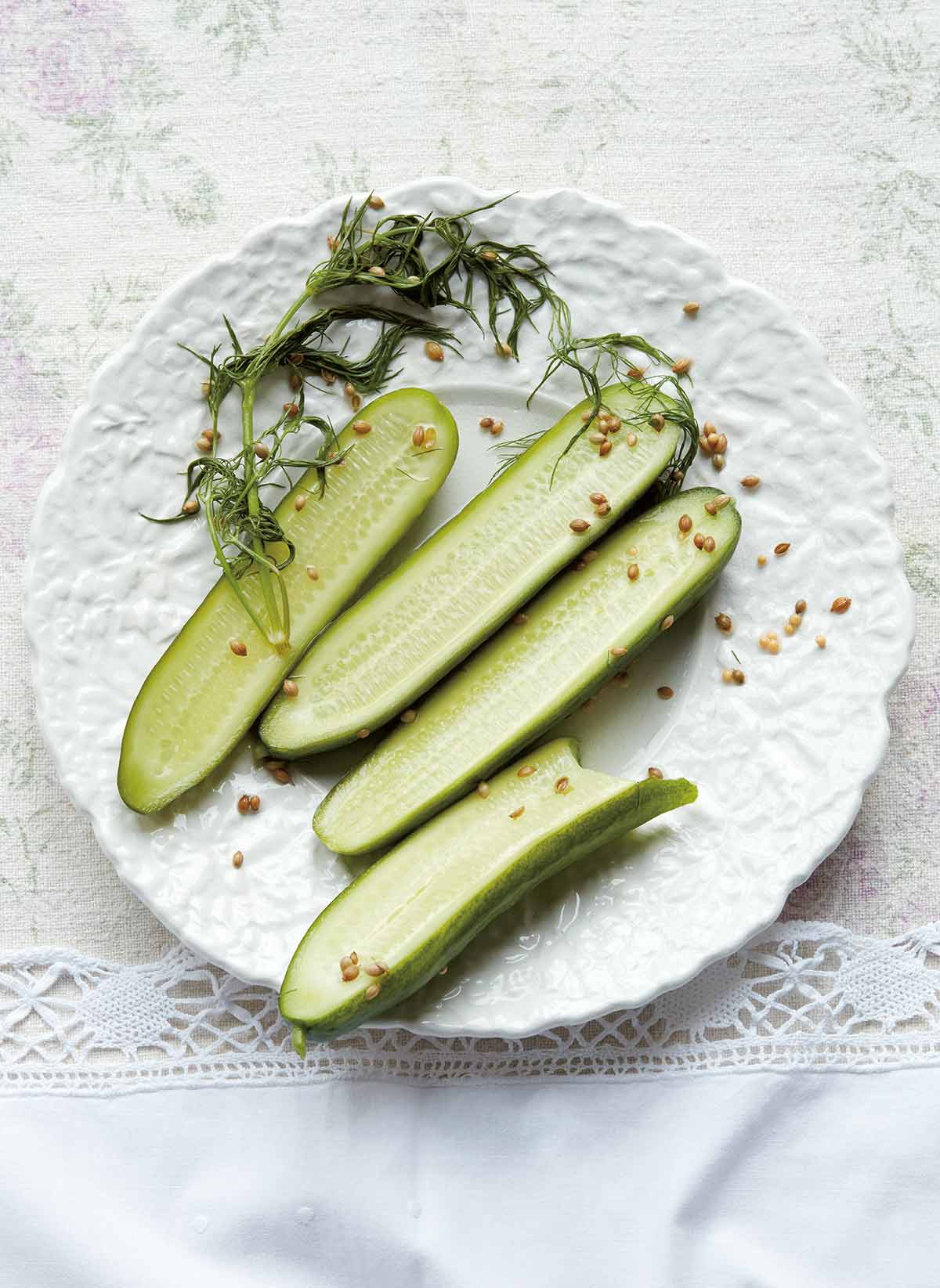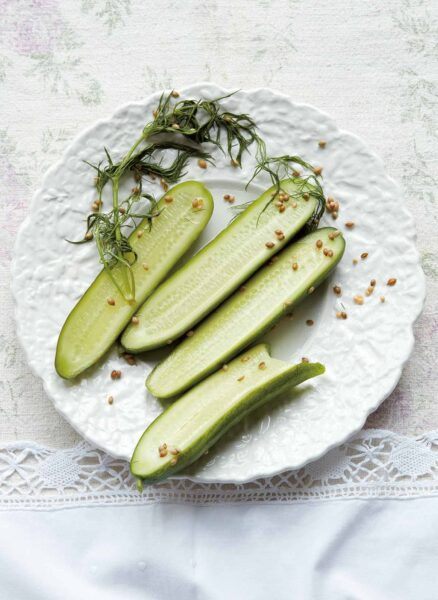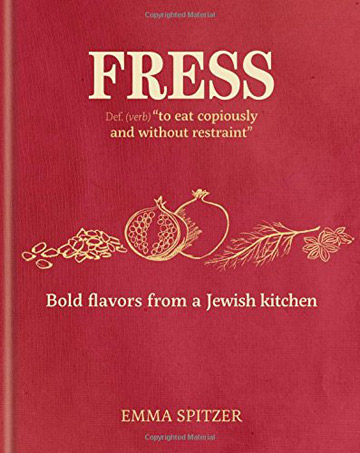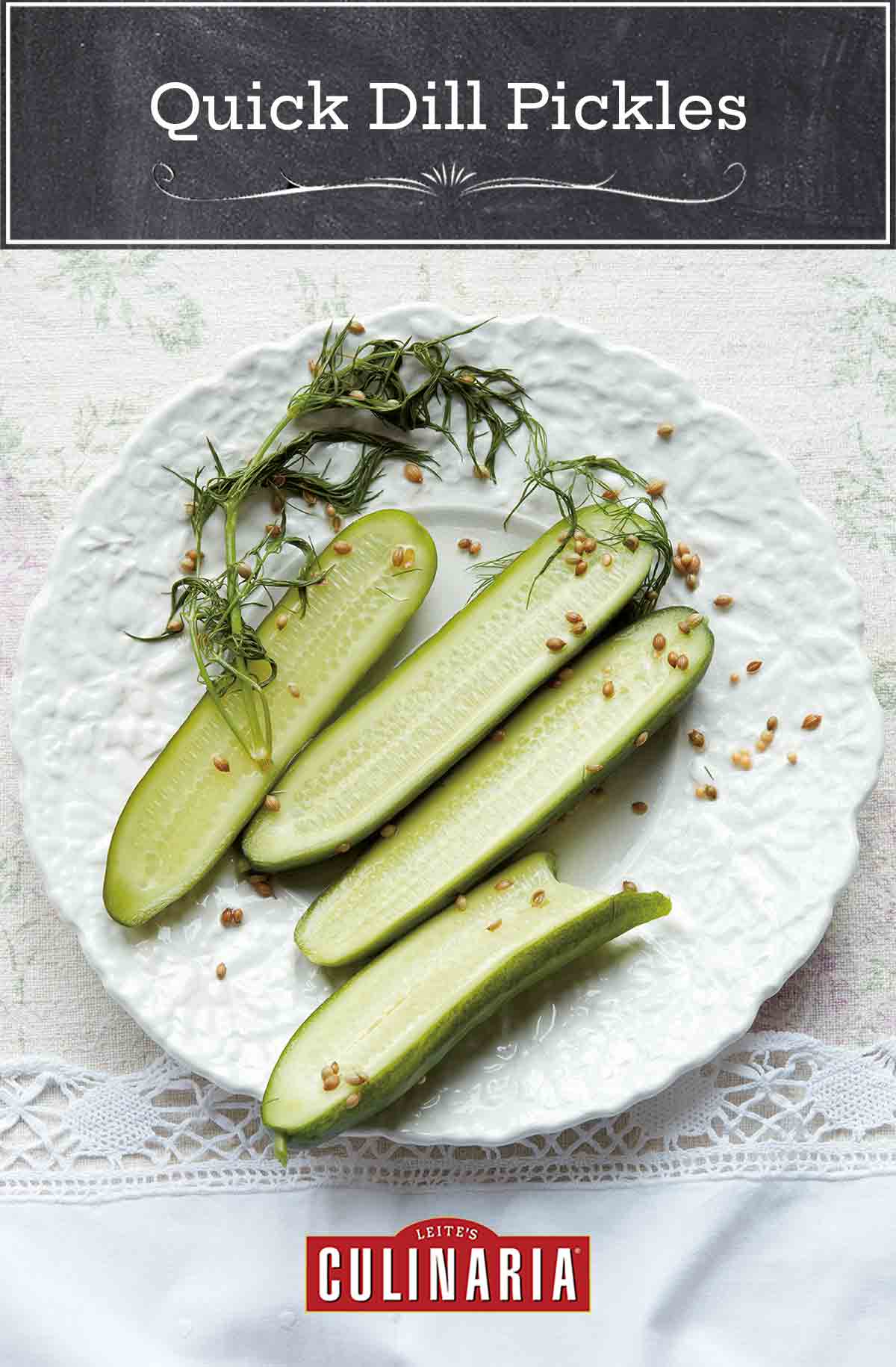
Quick dill pickles. One taste of these homemade refrigerator pickles and we dare say you’ll never, ever go back to store-bought. Rightfully so. And to clarify, when we say “quick,” we mean not just how long it takes to toss them together. But how quickly they’re gonna disappear.–David Leite
Quick Dill Pickles FAQs
When making this dill pickles recipe, try to seek out the relatively diminutive Lebanese, Turkish, and Persian cucumbers. These pickling cucumbers work so much better than standard full-size cucumbers.
Why? They’re less watery. Which means the resulting pickles hold their crunch vastly longer. If you don’t have these varieties in your backyard garden, you’ll find them at most farmers’ markets and supermarkets as well as Middle Eastern markets.
Quick pickles are so easy to make and handy to have stashed in the fridge, so why stop at cucumbers? You can easily pickle carrots, shallots, red onions, or zucchini. It’s a great way to use up a glut of vegetables.
Stored properly, in a covered jar in the refrigerator, these pickles will keep for 4 to 6 weeks.

Quick Dill Pickles
Equipment
- A couple of 1-quart (946 ml) jars with lids and rings (ideally, the jars will be tall enough for the cucumbers to stand vertically inside the jars)
Ingredients
- 3/4 cup distilled white vinegar
- 3 tablespoons sea salt
- 3 tablespoons superfine sugar or simply blitz granulated sugar in a food processor until finely ground but not powdery
- 1 1/4 cups cold water
- 8 small Lebanese, Turkish, Persian, or Kirby cucumbers, halved lengthwise
- 4 large garlic cloves, peeled and halved
- 1 1/2 tablespoons coriander seeds
- 1 1/2 teaspoons mustard seeds, yellow or brown
- 10 sprigs of dill
Instructions
- Wash the jars, lids, and rings with hot soapy water. Then fill your largest stock pot with the jars (but not the lids) and enough water to cover the jars by 1 inch (you may need to do this in batches). Bring water to a boil and simmer for 10 minutes. Carefully drain the water from the jars and transfer them to a clean towel using a jar lifter or tongs.
- In a medium nonreactive saucepan over medium heat, warm the vinegar, salt, and sugar, stirring, until the sugar and salt have dissolved, about 10 minutes. Pour the brine mixture into a bowl and whisk in the 1 1/4 cups cold water. Let the brine cool to room temperature, 30 to 45 minutes. If not making the pickles right away, cover and refrigerate until needed.
- Divide the cucumbers between a couple 1-quart preserving jars that are tall enough to hold the cucumber spears vertically. Add half the garlic, coriander seeds, mustard seeds, and dill sprigs to each jar. Pour the brine equally over the cucumbers, topping off each jar with cold water if necessary to completely cover the cucumber spears.
- Seal the jars and, if you added additional water, shake each jar gently to mix. Stash in the fridge for at least 24 hours before noshing on the quick dill pickles. The flavors will mellow with time. You can keep them in the fridge for up to 10 days—although we sincerely doubt they’ll last that long.

Explore More with AI
Nutrition
Nutrition information is automatically calculated, so should only be used as an approximation.
Recipe Testers’ Reviews
I’ve been looking for a good quick refrigerator pickle recipe for some time now and this one is just perfect.
The only thing that I changed was the amount of coriander seed; I love the flavor of coriander but I thought that amount might be overpowering. I used half the amount suggested and am pleased with the taste.
I used 2 standard quart jars and the cucumbers fit exactly. I didn’t need to add any more cold water to the jar as the amount of brine was sufficient to cover the cucumbers.
After 24 hours, the dill pickles were good—still very crisp and fresh tasting if quite briny. After sitting a few more days, they were excellent. The flavors of the vinegar, garlic, and coriander mellowed and the pickles were still crisp.
This is a simple recipe for really great quick dill pickles and I look forward to making it again.
These were the best refrigerator pickles I have ever made or tasted!
I would not have believed you could make such a great dill pickle so quickly. Most refrigerator pickles or traditional ones tend to be bread and butter style, but these have perfect crunch and zing.
I first sampled them at the 24-hour mark. Daily sampling was required and only the slightest softening was detectable by day 4, but they still had plenty of crunch and distinct flavor. (While I am not a pickle expert, I am a lifelong pickle consumer, whether sampling my mother’s annual ribbon-winning pickles from living in a tiny town with the county fair deadlines on every homemaker’s calendar or being allowed to select a pickle out of a huge wooden barrel at Con Brown’s, the newsstand and saloon that was the center of our community.)
You probably will fit more than 8 Persian cucumbers in this batch. (I used 10.) The fresh dill works perfectly for this express-lane pickle although my mother always used dried dill seed heads that we saved at the end of summer for her longer traditional canning which had the time to extract the flavor.
I think the crispness should continue to hold since you don’t expose the cucumbers to heat, but seriously, these will not last much longer. Persian cucumbers are a bit shorter and less bumpy or ridged than Japanese cucumbers. My local Lebanese/Syrian owned International Gourmet market sells the Persian cucumbers and they are always nicer than the packaged ones at Trader Joe’s. I use them for all things cucumber.
Get out your largest stockpot for sterilizing the wide mouth quart and you still may need to lay the jars on their side. I could just fit 2 Mason quarts side by side and covered in a very full 9-quart sauce pot.
After several more weeks (just slightly under a month in the refrigerator), the homemade pickles are still lovely. They are slightly less crisp than initially, but still lovely and fresh-tasting.
This is a tasty, quick version of a dill pickle with no lengthy fermentation period. The dill really comes through and the coriander is a nice note as well. There is just a hint of sweetness from the sugar. I waited about 3 days to taste the pickles.
I used Kirby cucumbers instead of the Turkish or Lebanese cucumbers called for and, halved, they just filled two 1-quart jars. The amount of brine produced by the recipe, however, wasn’t quite enough to cover the cucumbers, so I had to make additional brine at the last minute. I would recommend doubling the brine (the vinegar, salt, sugar, and water but not the pickle seasonings), just to make sure you have enough to fill the jars. Other than that little glitch, this was an easy route to a nice pickle.
Note that garlic sometimes will turn blue in pickles. Don’t be alarmed! The garlic and the pickles are still perfectly safe to eat.
I like these very traditional cucumbers that have a good crunch. They’re mild and fresh-tasting and would be a refreshing accompaniment to heavy entrees like barbecued beef back ribs and hamburgers that are on the fatty side. I could easily eat a few of these dill pickles in one sitting.
I wasn’t able to find Lebanese or Turkish cucumbers so I bought small ones (about 5-inches long and 1 1/4-inches in diameter) that were sold as “mini seedless.” Six of them (12 halves) fit perfectly in each jar.
As someone who really loves pickling, I was surprised to learn about the Turkish or Lebanese cucumbers that this quick dill pickle recipe called for, which worked much better than the traditional English cukes I’ve used in the past.
As promised, this recipe delivered crisp and crunchy pickles with mellow notes of garlic, coriander, and mustard in the background. I prefer my pickles with a bit more of a punch so I will up the garlic next time I make these but have found a new staple recipe to keep in the fridge.
I used Persian cucumbers from the farmers market, prepared the quick dill pickles in the morning, and sampled one before dinner. They had a delicate flavor and are nicely crisp after 8 hours.
I set them out and everyone commented on how good they were. They really liked the light, fresh flavor and the size and texture of the Persian cucumbers. They went fast! The first batch didn’t make it to the 24-hour mark, so I added more cucumbers to the same brine and the next day they tasted the same but with a little more dill flavor. Very good! Great for the summer!















These pickles are simply the best! I’ve been searching for the perfect pickle recipe, and I will look no further. I’ve done canned pickles in a water bath for long term storage, and I find them too vinegary. I’ve tried the making the fermented kind, and I find them too funky or salty. These pickles are just right. They stay crunchy and taste delightfully fresh. Best of all you can make them all year round.
Thanks, Linda! We so appreciate you taking the time to share your experience with us.
Amazing except the salt amount listed is way to high. I had a hard time eating. I made it again but used half the salt and sugar.
Thanks so much for taking the time to let us know, Ris.
I’m still trying to find a recipe for new pickles or half sour. No vinegar. The new pickles were always served in the Greek diners on Long Island. They would give you a bowl of all types of pickles. Batampte brand (Jewish Brooklyn company) makes half sour & is sold in supermarkets. You have to get them when first made otherwise they will sour as time goes on.
Is anyone familiar with new pickles? They are very green and crunchy.
Mel, I found this recipe for new pickles. Does that help?
Thank you so much. I’m looking forward to trying these.
Mel, my pleasure!
Mel, I’m with you – no vinegar (they aren’t pickles; no fermentation). I prefer “pickles”. Hard to find in the store.
Sheila, if you have a good Jewish deli nearby, they might have some good-quality ones.